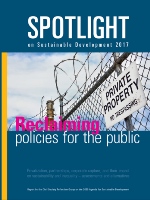Published on Mon, 2017-07-17 18:27
The SDGs are not a matter of developing countries that would only concern France in its external relations. They also impact French domestic policies. The targets that risk not being met reflect the fact that they are not first and foremost issues related to environmental protection in the French context; instead, half of the targets that will be difficult to reach concern economic and social issues such as employment, poverty, educational inequalities, gender equality and official development assistance (ODA). |
Published on Mon, 2017-07-17 18:24
Jordan struggles to withstand the impact of economic and demographic shocks. Regional conflicts disrupt the country’s key trade routes and cause tourism revenues to drop; inflows of migrant workers and refugees contribute to strain government resources and the national infrastructure, and have exacerbated labour market challenges. These challenges underline the importance of developing clear priorities, policies and strategies in promoting the country’s development and ensuring the well-being of its population, particularly its most vulnerable segments. However, Jordan’s development policies and strategies have lacked consistency and continuity, with successive governments (most of which have remained in power for periods shorter than two years) often eschewing their predecessors’ programmes. |
Published on Mon, 2017-07-17 12:26
Will national partnerships with private sector accelerate implementation if global obstacles remain? New York, 17 July 2017: On Monday, 17 July, the sponsors of the High-Level Panel report on Women’s Economic Empowerment are presenting a panel on “Accelerating women’s economic empowerment to achieve the 2030 Agenda”, head-lined by the Secretary-General. They will be joined by a diverse Member State ‘group of champions for women’s economic empowerment’. Given the knowledge and expertise of the High-Level Panel and the national level experience of the group of champions, they will have many examples of opportunities, but will they highlight the risks? |
Published on Fri, 2017-07-14 20:07
Civil Society activists critique first week of deliberations at High-level Political Forum on Sustainable Development. New York City, 14 July 2017: With the first week of deliberations at the 2017 High-level Political Forum on Sustainable Development coming to a close this Friday at the UN in New York, civil society activists are criticizing a piecemeal approach to the implementation of the 2030 Agenda for Sustainable Development. Especially worrisome to activists is a growing gap between aspirational goals and a lack of proper and comprehensive means of implementation. |
Published on Thu, 2017-07-13 11:03
Global Spotlight Report warns against risks of Public-Private Partnerships. Public-Private Partnerships (PPPs), usually portrayed as a useful tool towards sustainable development, actually “involve disproportionate risks and costs for people and the public purse”, claims a global coalition of civil society organizations and trade unions in the Spotlight Report 2017 launched earlier this week. “The proponents of privatization and public-private partnerships (PPPs) present the state as impoverished and unfit to deliver, leaving the private sector as the only way to provide the necessary means for implementing the SDGs”. |
SUSCRIBE TO OUR NEWSLETTER





